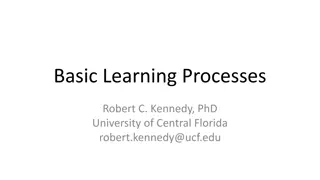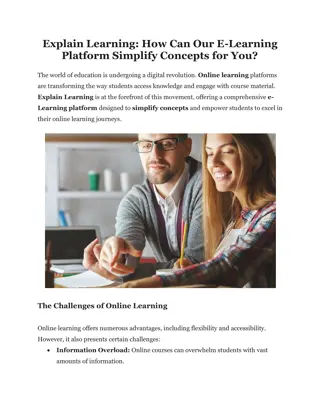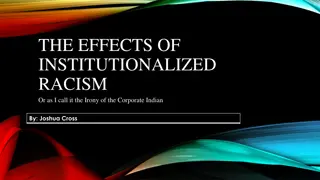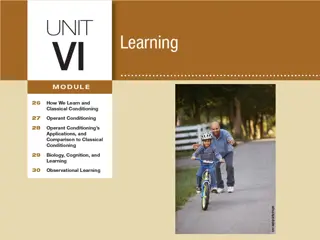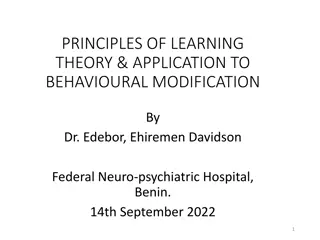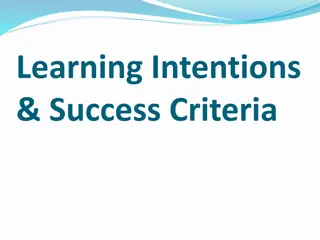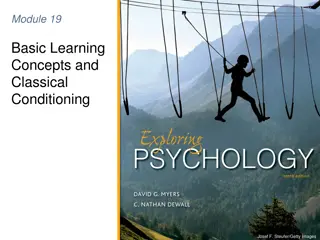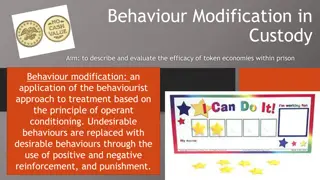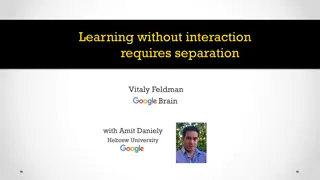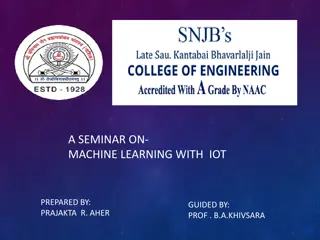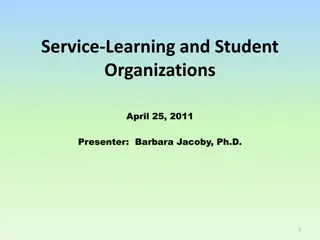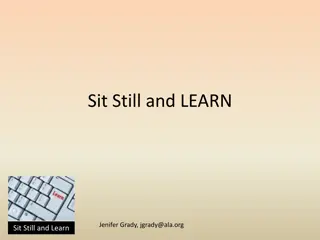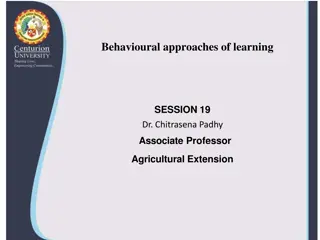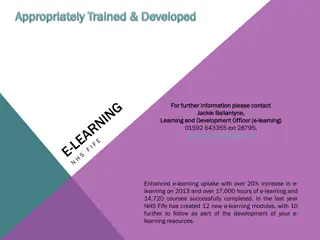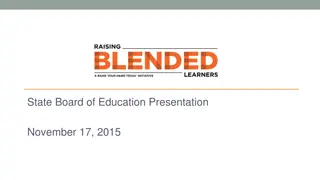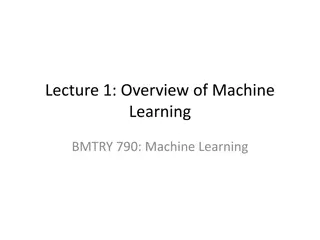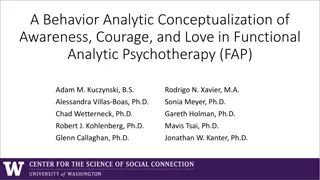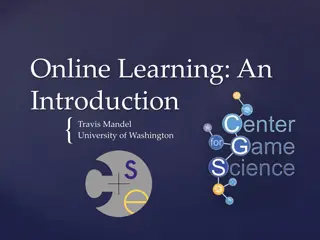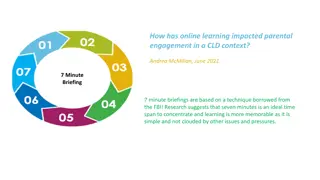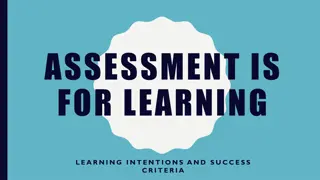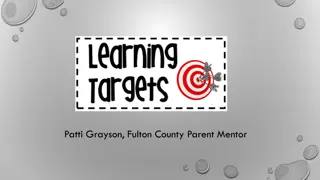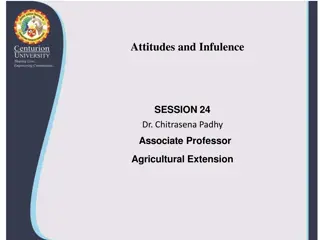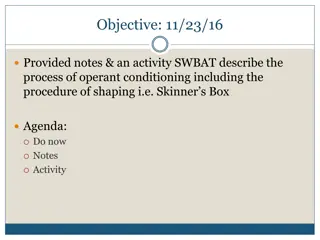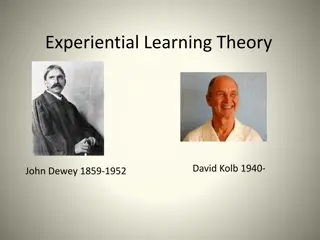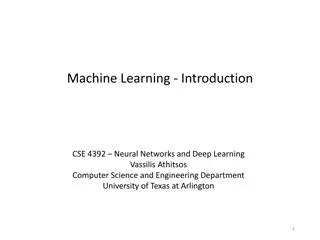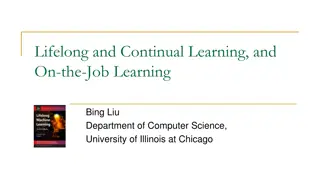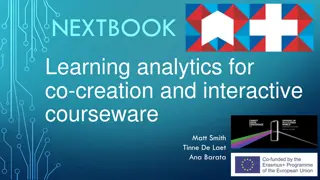Basic Learning Processes
Explore the essential vocabulary related to operant learning and reinforcement, including terms like automatic reinforcer, conditioned reinforcer, and positive reinforcement. Gain insights into theories such as drive-reduction theory and response-deprivation theory. Enhance your knowledge of behavio
3 views • 31 slides
Explain Learning How Can Our E-Learning Platform Simplify Concepts for You
Explain Learning is at the forefront of this movement, offering a comprehensive e-learning platform designed to simplify concepts and empower students to excel in their online learning journeys. Know more \/\/explainlearning.com\/blog\/explain-learning-e-learning-platform-simplifies-concepts\/
1 views • 4 slides
Unveiling the Effects of Institutionalized Racism on Indigenous Peoples
Delve into the intricate web of institutionalized racism faced by Indigenous communities, exploring key concepts like covert racism versus operant racism, decolonization, and settler benefits. Learn how historical injustices, such as the Indian Act, continue to impact Indigenous autonomy and the fig
9 views • 21 slides
Understanding and Applying Operant Conditioning Principles
Explore the various applications of operant conditioning in different settings such as school, sports, work, and home. Discover how reinforcement and punishment techniques can be used for self-improvement and stress management. Learn about the key differences between operant and classical conditioni
0 views • 19 slides
Understanding Principles of Learning Theory and Behavioral Modification
Explore the principles of learning theory and its application in behavioral modification, highlighting concepts such as classical and operant conditioning. Learning, defined as a permanent change in behavior due to experience, is distinguished from performance. Discover how learning potential differ
2 views • 48 slides
Understanding Learning Intentions and Success Criteria
Learning intentions and success criteria play a crucial role in enhancing student focus, motivation, and responsibility for their learning. Research indicates that students benefit greatly from having clear learning objectives and criteria for success. Effective learning intentions should identify w
1 views • 24 slides
Online Seminar: Theories of Learning in Initial Teacher Education
This collection of online seminar slides introduces pre-service teachers to major theories of learning, including the Science of Learning through cognitive neuroscience. The presentation aims to help educators consider implications for teaching, recognize theories in action, and pose critical questi
1 views • 11 slides
Examples of Classical and Operant Conditioning
Robert receiving a ticket for driving under the influence illustrates operant conditioning with negative punishments, while Chris being afraid of dogs after being bitten showcases classical conditioning with stimulus generalization. Jacob's joy from smelling his date's cologne demonstrates classical
1 views • 9 slides
Understanding Basic Learning Concepts and Classical Conditioning
Acquiring new information and behaviors through experience is known as learning. One common way we learn is through associative learning, where we connect certain events together. This process can take the form of classical conditioning, where stimuli evoke automatic responses, or operant conditioni
1 views • 14 slides
Token Economies and Behaviour Modification in Custody: Evaluating Efficacy
This article explores the application of token economies in prisons as a behaviour modification technique based on operant conditioning. Token economies involve exchanging tokens for desired behaviours, aiming to replace undesirable actions with positive reinforcement. The use of increments, consist
0 views • 19 slides
Experiential Learning Portfolio Program at Barry University
Experiential Learning Portfolio Program at Barry University's School of Professional and Career Education (PACE) offers a unique opportunity to earn college credit for learning gained from work and community service experiences. Through this program, students can showcase their experiential learning
0 views • 16 slides
Understanding Behavioral Therapy in Psychotherapeutics
Behavioral therapy focuses on observable behavior and learning experiences to bring about change and enhance skills. It is used to treat a wide range of psychological disorders and is applicable in various fields such as developmental disabilities, education, clinical psychology, and rehabilitation.
0 views • 20 slides
Understanding Punishment in Operant Behavior
Aversive stimuli can influence operant behavior through noncontingent punishment, as seen in conditioned emotional responses like conditioned suppression. The threat of upcoming aversive events can reduce responding, highlighting the importance of conditioned emotional responses. Punishment operates
0 views • 27 slides
Understanding Superstitious Behavior Through Operant Conditioning Experiments
Explore the phenomenon of superstitious behavior through the lens of operant conditioning experiments conducted by behaviorists like B.F. Skinner. Discover how noncontingent reinforcement can lead to the development of superstitious beliefs in both humans and animals, as demonstrated in various stud
0 views • 8 slides
Exploration of Learning and Privacy Concepts in Machine Learning
A comprehensive discussion on various topics such as Local Differential Privacy (LDP), Statistical Query Model, PAC learning, Margin Complexity, and Known Results in the context of machine learning. It covers concepts like separation, non-interactive learning, error bounds, and the efficiency of lea
0 views • 14 slides
Seminar on Machine Learning with IoT Explained
Explore the intersection of Machine Learning and Internet of Things (IoT) in this informative seminar. Discover the principles, advantages, and applications of Machine Learning algorithms in the context of IoT technology. Learn about the evolution of Machine Learning, the concept of Internet of Thin
0 views • 21 slides
Understanding Reinforcement and Association in Behavioral Psychology
This content delves into the concepts of reinforcement, association, and operant conditioning in behavioral psychology. It discusses how actions are influenced by rewards and consequences, the differences between association and reinforcement, and classical conditioning models like the Rescorla-Wagn
0 views • 8 slides
Innovative Learning Management System - LAMS at Belgrade Metropolitan University
Belgrade Metropolitan University (BMU) utilizes the Learning Activity Management System (LAMS) to enhance the learning process by integrating learning objects with various activities. This system allows for complex learning processes, mixing learning objects with LAMS activities effectively. The pro
4 views • 16 slides
Exploring Service-Learning and Student Success in Higher Education
This presentation by Dr. Barbara Jacoby delves into the intersection of service-learning and student organizations, emphasizing the public purpose of higher education, student engagement in learning, and the importance of learning outcomes and assessment. It covers fundamental principles, designing
2 views • 23 slides
Unlocking the Power of Online Learning with Jenifer Grady
Explore the transformative nature of learning through online platforms with insights from Jenifer Grady. Understand the essence of learning, reasons behind learning, accessibility, and the concept of online learning. Discover how learning can be achieved anywhere, anytime, and delve into the world o
0 views • 26 slides
Enhancing Learning Through Active Strategies and Learning Styles
Implement active learning strategies to engage students, deliver and review content, and foster collaboration. Explore Kolb's Learning Styles to accommodate diverse learner preferences and maximize learning outcomes. Integrating learning activities based on individual styles can create a more effect
0 views • 22 slides
Understanding Behavioral Approaches of Learning
The behavioral approach to learning examines how observable behaviors are influenced by environmental factors. It emphasizes the role of stimuli and reinforcement in shaping behavior through classical and operant conditioning. Classical conditioning, illustrated by Pavlov's dogs, involves associatio
0 views • 9 slides
NHS Fife E-Learning Success and Development Overview
NHS Fife has significantly enhanced its e-learning provision under the leadership of Jackie Ballantyne, with a notable increase in uptake and successful completion of courses. The development of over 80 e-learning programs has resulted in cost savings and improved accessibility to learning opportuni
0 views • 8 slides
Blended Learning Initiatives in Education: RYHT Presentation Overview
Blended learning, as defined in the State Board of Education presentation on November 17, 2015, is gaining traction in K-12 education for achieving student-centered learning at scale. The presentation highlights the potential benefits of blended learning in enhancing student achievement through pers
0 views • 10 slides
Introduction to Machine Learning in BMTRY790 Course
The BMTRY790 course on Machine Learning covers a wide range of topics including supervised, unsupervised, and reinforcement learning. The course includes homework assignments, exams, and a real-world project to apply learned methods in developing prediction models. Machine learning involves making c
0 views • 62 slides
Introduction to Applied Behavior Analysis (ABA): Basics and Applications
ABA is a systematic approach that aims to improve behaviors through reinforcement strategies, focusing on operant conditioning principles. It targets various groups like toddlers, school-aged children, teens, and young adults. ABA is widely used for disorders such as substance use disorder, eating d
0 views • 30 slides
Understanding Functional Analytic Psychotherapy (FAP) Concepts
Delve into the Behavior Analytic Conceptualization of Awareness, Courage, and Love in Functional Analytic Psychotherapy (FAP). Explore the principles of FAP, including clinically relevant behaviors, the therapeutic relationship, and the five rules guiding the practice. Discover how FAP targets behav
0 views • 21 slides
Understanding Avoidance Behavior and Its Theories
Avoidance behavior involves negative reinforcement to increase the frequency of operant responses, not punishment. Different types of avoidance tests, such as discriminated avoidance and shuttle avoidance, are used to study negative reinforcement. The Two-Factor Theory of avoidance conditioning expl
0 views • 61 slides
Understanding Online Learning in Machine Learning
Explore the world of online learning in machine learning through topics like supervised learning, unsupervised learning, and more. Dive into concepts such as active learning, reinforcement learning, and the challenges of changing data distributions over time.
0 views • 49 slides
Basics of Learning: Classical and Operant Conditioning Overview
Types of learning include classical conditioning, operant conditioning, and observational learning. Classical conditioning involves pairing a neutral stimulus with a meaningful one to elicit a response. Operant conditioning focuses on how consequences influence behavior. Terminology like UCS, UCR, N
0 views • 66 slides
Impact of Online Learning on Parental Engagement in CLD Context
The global pandemic in 2020 led to the closure of schools, shifting learning to online platforms. This study explores how online learning has affected parental engagement in Culturally and Linguistically Diverse (CLD) contexts. Family Learning, distinct from homeschooling, plays a crucial role in en
0 views • 11 slides
Maximizing Student Learning Through Effective Assessment Strategies
Explore the importance of assessment for learning, learning intentions, and success criteria in educational settings. Discover how to create and implement effective learning intentions, success criteria, formative assessment, and feedback practices to drive student progress and achievement. Dive int
0 views • 49 slides
Importance of Learning Targets in Educational Settings
Learning targets play a crucial role in guiding educational sessions by outlining what learners are expected to achieve and how they will demonstrate their learning. They help keep everyone focused, aid in data collection for target groups, and act like GPS directions for learning goals. Learning ta
0 views • 18 slides
Understanding Motivation and Change in Fall 2013
Delve into the various aspects of motivation and change in Fall 2013, exploring theories like Achievement Motivation Theory, Self-Determination Theory, Operant Conditioning, and Motivational Interviewing. Discover the complexities of motivating individuals and draw inspiration from historical events
0 views • 130 slides
Understanding Attitudes and Influence in Behavior Formation
Attitudes are influenced by various factors such as experience, social roles, conditioning, and observation. They can be learned through classical and operant conditioning and by observing others. However, attitudes do not always align with behavior. Factors influencing attitude strength include exp
0 views • 16 slides
Understanding Operant Conditioning: The Process and Importance
Operant conditioning is a type of learning where behavior is influenced by its consequences. This process, famously studied by B.F. Skinner, involves shaping behavior through reinforcement or punishment. By understanding how behaviors are reinforced or diminished, we can better comprehend how volunt
0 views • 36 slides
Understanding Experiential Learning Theory and its Applications
Experiential Learning Theory, developed by David Kolb and influenced by John Dewey, emphasizes the role of experience in learning. It consists of four modes - Concrete Experience, Reflective Observation, Abstract Conceptualization, and Active Experimentation - forming a continuous learning cycle. Th
1 views • 10 slides
Understanding Machine Learning: Types and Examples
Machine learning, as defined by Tom M. Mitchell, involves computers learning and improving from experience with respect to specific tasks and performance measures. There are various types of machine learning, including supervised learning, unsupervised learning, and reinforcement learning. Supervise
0 views • 40 slides
Lifelong and Continual Learning in Machine Learning
Classic machine learning has limitations such as isolated single-task learning and closed-world assumptions. Lifelong machine learning aims to overcome these limitations by enabling models to continuously learn and adapt to new data. This is crucial for dynamic environments like chatbots and self-dr
0 views • 32 slides
Enhancing Learning Through Co-Created Interactive Courseware and Learning Analytics
Explore the innovative concept of co-creation in interactive courseware and learning analytics to improve student learning outcomes. Discover how students collaborate in a social learning environment, track their progress, and engage in dialogic and constructive pedagogical strategies. Harness the p
0 views • 19 slides
